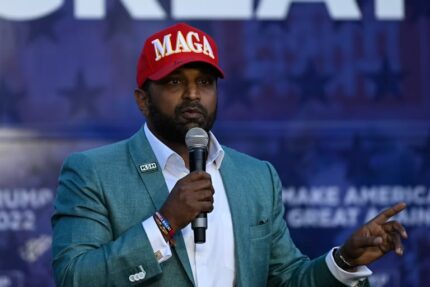President-elect Donald Trump has made a bold move in selecting Kash Patel to potentially lead the Federal Bureau of Investigation, signaling a significant potential shift in the agency’s leadership. Patel, a former defense department chief of staff during Trump’s first administration, has been a vocal critic of the FBI and a staunch supporter of the incoming Republican president. His selection comes with a notable caveat: current FBI Director Christopher Wray would need to resign or be removed from his position.
Patel’s background is as unique as his potential appointment. The son of Indian immigrants and a former defense lawyer and federal prosecutor, he first caught Trump’s attention in 2017 when he became a senior counsel to the House Representatives intelligence committee. His career trajectory includes roles as a national security aide and chief of staff at the Pentagon, complemented by his outspoken criticism of what he calls “government tyranny” and the “deep state”.
A Profile of Confrontation and Controversy
Known for his provocative stance against government institutions, Patel has consistently advocated for dramatically limiting the FBI’s authority. In his memoir “Government Gangsters,” he explicitly called for firing top-ranking FBI officials, positioning himself as an “America First” fighter committed to exposing what he perceives as institutional corruption. His controversial approach extends beyond government critique, with published children’s books that feature thinly veiled political allegories casting Trump as a heroic king and his opponents as villains.
Patel’s nomination reflects a broader pattern of Trump selecting loyalists who share his skepticism of established governmental structures. His connection to Trump’s media ventures, including a board position at Trump Media and Technology Group and a reported consulting contract, further underscores the close relationship between the potential FBI director and the incoming president.
Trump Additional Appointments in Law Enforcement
Alongside the potential FBI leadership change, Trump has also nominated Chad Chronister, Hillsborough County’s sheriff, to lead the Drug Enforcement Administration. Chronister brings 32 years of law enforcement experience to the role, with Trump emphasizing his potential to address border security and combat illegal drug trafficking. The president-elect praised Chronister’s commitment to stopping the flow of fentanyl and other illegal substances across the southern border.
These appointments, including the nomination of Pam Bondi as Attorney General, represent a comprehensive reshaping of key law enforcement leadership positions. Each nominee will require confirmation by a majority vote in the US Senate, ensuring a level of institutional scrutiny despite Trump’s direct selections.
Institutional Implications and Future Outlook
The potential appointment of Patel represents more than a simple leadership change; it signals a potentially transformative approach to federal law enforcement. His history of criticizing the FBI, including his claims about institutional corruption and his advocacy for significant structural changes, suggests that if confirmed, he could implement substantial reforms at the agency.
The FBI’s measured response to Donald’s announcement—emphasizing the ongoing commitment of its agents to protecting Americans—hints at the potential internal tension such a leadership change might create. Patel’s selection comes at a time of increased scrutiny of federal law enforcement, particularly following investigations into Trump’s handling of classified documents.
As these nominations move forward, they will undoubtedly spark intense political debate about the role of leadership in federal agencies and the balance between political appointees and long-standing institutional practices.
Senate Confirmation Awaits
The nominations of Patel, Chronister, and Kushner now rest in the hands of the U.S. Senate, which must confirm their appointments. As Trump’s law enforcement team takes shape, these picks underscore his intent to lead with a loyal and reform-driven administration. With significant challenges ahead, their leadership will be pivotal in shaping the trajectory of key government agencies under Trump’s presidency.














